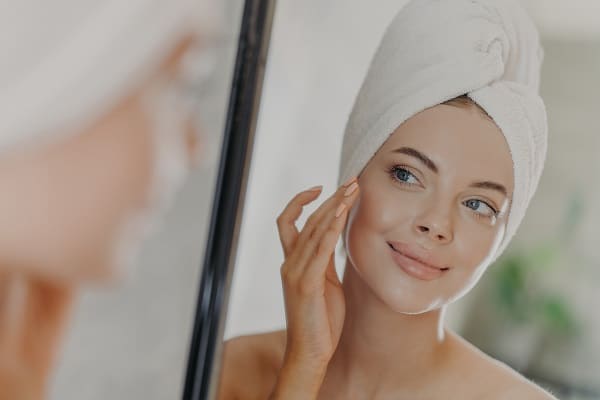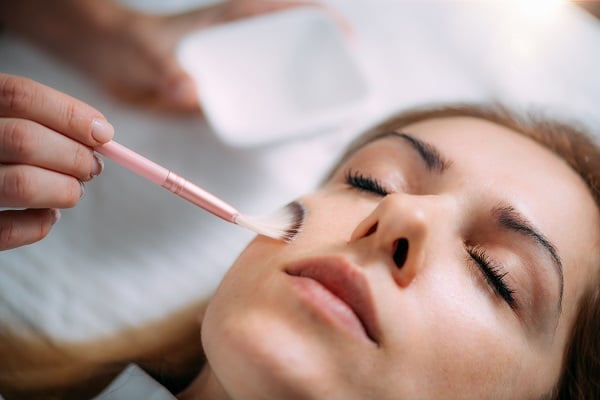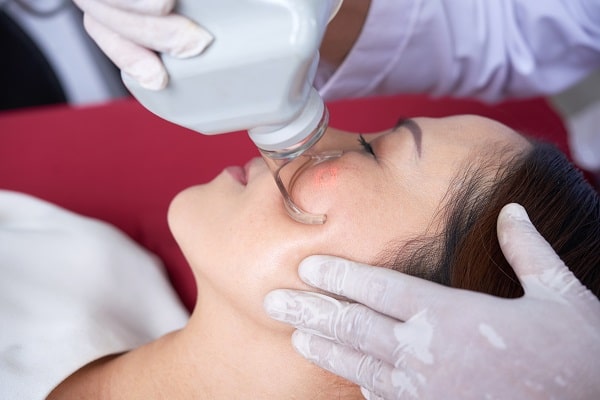If you’re struggling with dark spots, you’re not alone. Many people deal with this skin concern, which can be due to various factors, including sun damage, acne, and even aging. While dark spots can be challenging to get rid of, numerous effective treatments are fortunately available. If you are wondering how to get rid of dark spots, you have come to the right place. This article will provide several tips and tricks for getting rid of those pesky dark spots.
What Are Dark Spots?

While most people think of dark spots as a cosmetic issue, they can signify something more serious. Also called hyperpigmentation, dark spots are areas of skin that have increased melanin production. Melanin is the pigment that gives skin its color, so when the body produces it in excess, it can result in patches of darker skin.
While dark spots are generally harmless, they can cause concern if they start to spread or change color. If you’re concerned about dark spots on your skin, it’s best to consult with a dermatologist.
How To Get Rid Of Dark Spots?
Retinoids

Retinoids are a type of Vitamin A commonly used in skin care products. They work by increasing cell turnover and boosting collagen production, improving the appearance of fine lines, wrinkles, and dark spots. All of this helps improve the skin’s overall tone and texture.
Additionally, retinoids are effective at unclogging pores and reducing inflammation. When used consistently, retinoids can help to create a brighter, more even-toned complexion. If you are looking for a skincare product that can help improve the appearance of dark spots, look for one with retinoids. Used as directed, retinoids can help create a clearer, more youthful-looking complexion.
Numerous over-the-counter retinoids are available, but prescription-strength retinoids are more potent and may be more effective in treating dark spots. If you are considering using a retinoid to lighten dark under-eye circles, it is essential to consult with a dermatologist first. Retinoids can cause irritation, redness, and dryness, so it is necessary to use them as directed.
Chemical Peels

A chemical peel is a cosmetic treatment (typically used on the face) in which an esthetician applies a chemical solution to the skin, causing it to exfoliate and eventually peel off. The new skin revealed after a chemical peel is usually smoother and less wrinkled than the old skin. Chemical peels treat a variety of skin concerns, including acne, scarring, sun damage, and age spots. Some types of chemical peels can also lighten dark under-eye circles.
Chemical peels work by exfoliating the skin and stimulating cell turnover. The new skin generated is usually smoother and less wrinkled than the old one. Depending on the desired results, chemical peels can be performed at various depths. There are three main types of chemical peels: superficial, medium, and deep.
Superficial peels are the least aggressive and only remove the top layer of skin. Medium peels penetrate deeper, removing damaged cells from the middle layer of skin. Deep peels penetrate the deepest layer of skin and are thus the most aggressive type of peel. All three types of peels can effectively lighten dark under-eye circles.
While chemical peels can be effective in lightening dark under-eye circles, they are not without risks. A chemical peel’s most common side effect is irritation, which can range from mild to severe. Other potential side effects include redness, swelling, and crusting. It is important to consult with a dermatologist before undergoing a chemical peel to ensure that it is the proper treatment for you.
Hydroquinone Creams

Hydroquinone works by inhibiting the production of melanin, the pigment that gives skin its color. Currently, two main types of hydroquinone are available on the market: 4% hydroquinone and 6% hydroquinone. 4% hydroquinone is available without a prescription, while 6% hydroquinone requires a prescription.
Hydroquinone must be used consistently and over an extended period to be effective. The average treatment plan lasts for 3-4 months. Side effects of hydroquinone include temporary redness, itching, and dryness. In rare cases, hydroquinone can cause permanent skin discoloration. Therefore, it is essential to consult with a dermatologist before starting any treatment plan.
While hydroquinone is the most popular depigmenting agent available on the market, it is not the only option. Other products that contain kojic acid or azelaic acid can also be effective in lightening dark spots. Natural depigmenting agents such as bearberry extract and licorice root extract are also gaining in popularity. These agents work by inhibiting the production of melanin, just like hydroquinone. However, they are considered to be safer and have fewer side effects.
Laser Treatment

Dark patches can result from fatigue, allergies, or genetics. While they are not usually a cause for concern, many people find them cosmetically unappealing. Fortunately, many treatments can help to reduce the appearance of dark circles. One option is laser treatment.
Laser therapy targets the melanin in the skin, which gives the skin its color. The laser breaks up the melanin, which can help lighten the darkened area under the eyes over time. Several different lasers can be used for this purpose, and your doctor will select the best one for your individual needs.
Laser therapy is generally safe and effective, but there are a few potential side effects. These can include temporary redness, swelling, and bruising. More serious side effects can occur in rare cases, such as permanent skin discoloration. It is important to consult with a dermatologist before undergoing laser therapy to ensure that it is the proper treatment for you.
Talk To A Dermatologist About Getting Rid Of Your Dark Spots
While many over-the-counter treatments can help fade dark spots, talking to a dermatologist before using any product is essential. Some dark spots are a sign of an underlying health condition, and a dermatologist can help determine the cause. In addition, a dermatologist can prescribe more potent treatments, such as laser therapy or chemical peels, if over-the-counter products are not proving effective. Talk to a dermatologist today to find the best way to get rid of your dark spots.


